Tuesday 13 June 2023 4:20pm
Aotearoa New Zealand's wildlife and natural environment will benefit from three conservation-based scholarships recently awarded to Otago postgraduate students.
In March, Marine Science PhD candidate Stephanie Bennington was named the first recipient of the Marks' Ecology Award, a generous gift from renowned conservationists Emeritus Professor Sir Alan and the late Lady Pat Mark.
Also in its inaugural year, the Isaac Conservation and Wildlife Trust Scholarship was awarded to Rose Ursem, who is studying for a Master of Marine Science and is a committed volunteer for a variety of conservation organisations.
The Leslie Hutchins Conservation Foundation continues to support masters' students in their studies, with Kate Moss-Mason, Iona Grigor and Aimee Pritchard receiving scholarships this year.
Professor Christoph Matthaei, Director of the cross-departmental Ecology Degree Programme at Otago, says he is delighted that these three awards were given this year to support outstanding postgraduate students in doing ecological research.
“I would like to thank the donors once more for generously offering the awards,” says Professor Matthaei. “The two new awards complement the long-running Leslie Hutchins Conservation Foundation awards, which support ecological research in Southern New Zealand, very nicely. Getting sufficient funds to conduct ecological research is always challenging, and these three awards will make a real difference to this year's, and future, recipients.”
Marks' Ecology Award
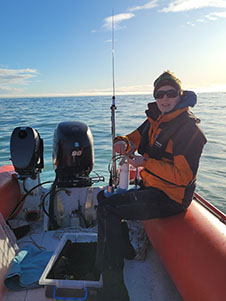
Steph Bennington
In 2020, as part of their efforts to further the aims of environmental conservation and boost ecological education, the Marks made a generous gift to the University's Ecology Fund. In 2022, The Marks' Ecology Award was established, with the aim of supporting promising University of Otago students undertaking ecological research.
Fittingly, the first recipient of the $4,000 award, Marine Science PhD candidate Steph Bennington, has previously worked as a Conservation Ranger at the Yellow-eyed Penguin Trust, an organisation close to Lady Pat's heart.
Steph's research is focused on the endemic Hector's dolphin and their recovery potential, or future population trends. She aims to investigate habitat use, connectivity and reproduction potential of the endangered dolphin populations. To do this she will investigate the biology and ecology of the dolphins in several known populations along the south-east coast of the South Island.
"I am honoured to have received the Marks' Ecology Award,” says Steph. “Not only does it encourage me that people outside my immediate network can see value in the work I am undertaking, but it has already supported my research through helping with field-based costs. I have one more planned field season and I know that this award will continue to benefit my research and hopefully, through extension, the conservation and management plans for Hector's and Māui dolphin.
“I strongly believe that as the world and our oceans change, research that incorporates long-term monitoring, innovative technology and quantifiable research is necessary to push our understanding forward and ensure that our conservation actions be effective.”
Isaac Conservation and Wildlife Trust Scholarship
This recently-established scholarship generously gifts the recipient $20,000 per year, over two years. It will support a maximum of three students over six years, from December 2021, with only one recipient of the scholarship in each calendar year.
The scholarship is available to a master's student with strong academic results, whose study is focussed on ecological research which supports the preservation, amelioration and deeper knowledge of flora and fauna as it relates to healthy biodiversity within New Zealand.

Rose Ursem
Awarded for the first time this year, inaugural recipient Rose Ursem is an academically outstanding student, having studied across a range of disciplines including Ecology, Marine Science, Statistics and Law.
Rose is also a committed volunteer with the Department of Conservation, Orokonui Ecosanctuary Care Community Group and president of the University's Animal, Aquatic, Plant, Ecological Society.
Her master's research aims to build a picture of how cruise ships could be changing Hector's dolphin distribution in Akaroa Harbour, such as changes to turbidity, benthic structure, prey presence and soundscape. She will use passive acoustic monitoring to identify dolphin presence at sites with cruise ships, and control locations.
She also aims to use long-term data for dolphins in Akaroa Harbour to identify potential changes in distribution over the three years of cruise ship absence during COVID-19.
“I aim to identify the potential drivers of this pattern, which is really critical for reducing the effects of cruise ships on the marine environment,” says Rose. “My research may identify the largely unknown effects of cruise ship activities on dolphins, and inform sustainable management of tourism industries, both in Akaroa and around the world.”
Rose says she feels very lucky to be the first recipient of the scholarship. “Embarking on starting a master's is a huge financial commitment, and the scholarship really helps take this stress away so I can focus on my research over the next couple years.
“It's also an awesome opportunity to connect with the Trust, who undertake an array of super-important conservation work around the country. It's really great to see conservation research being funded for masters' students, and in this sense the Isaac Conservation Scholarship is really a unique scholarship.”
Executive Trustee Chair Rob Clarke, says The Isaac Conservation and Wildlife Trust's (ICWT) conservation objectives are concentrated on the preservation and amelioration of NZ native flora and fauna.
“Education is a key component, and the late Sir Neil Isaac used 'A Study in Conservation' as his tagline. For approximately two decades now conservation-based postgraduate scholarships have been available at the Universities of Canterbury and Lincoln.
“In recognition of the University of Otago's dedication and achievements towards ecological research studies within the Division of Sciences, ICWT is delighted to extend an Isaac scholarship, to support Otago postgraduate students who are studying to gain a greater understanding of ecology, biodiversity and eco-restoration, as it relates to New Zealand's natural environment.”
Leslie Hutchins Conservation Foundation Scholarships
This award supports students undertaking ecological research during their thesis or second year of study while enrolled in a master's research programme at Otago. Each year, up to three recipients receive funding of $8,000 to support the costs of their research.
Les Hutchins DCNSM, OBE, JP (1924-2003) founded the charitable trust in 1994 because of his lifelong interest in conservation. He was a member of both the National Parks and Reserves Authority of New Zealand and the International Union for Conservation of Nature, as well as a Guardian of Lakes Manapouri, Monowai, and Te Anau. He dedicated his life to ensuring as many people as possible could enjoy New Zealand's Southern Parks and conservation areas through his dedicated volunteer efforts and astute tourism operating ventures. The current Foundation originated with the Real NZ, formerly Real Journeys, Foundation.
Recipients of the award will be undertaking research that is ecological and/or conservation-focused in Southland (including the Fiordland National Park World Heritage Area), Otago and Stewart Island, and the Sub-Antarctic Islands within the New Zealand Economic Zone.
“The Leslie Hutchins Conservation Foundation is pleased to be able to partner with the University of Otago to provide three scholarships for masters' students to complete field work research to support their studies,” says Chair of the Foundation, Paul Norris. “These successful students are completing masters' studies that are aligned with our Foundation and its objectives.”
Kate Moss-Mason
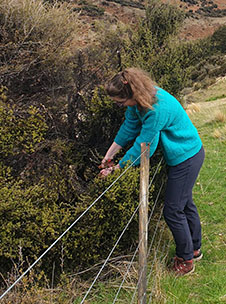
Kate Moss-Mason
This year, Botany master's student Kate Moss-Mason has received $6,100 for her research into Ecological Restoration in a Climate Change Framework.
Her research aims to establish a climate-adjusted provenancing trial with mānuka, Leptospermum scoparium across three sites of the South Island, in Taieri Beach, the Motatapu Valley, and in Fortrose, Southland. This research investigates an alternative form of seed-sourcing known as climate-adjusted provenancing, which seeks to future-proof efforts of ecological restoration against environmental change.
Kate will also investigate pre-treating native seeds, including harakeke, corokia, wineberry, marbleleaf, mountain beech, and whiteywood, to break dormancy, so that a greater range of species may be readily available for national restoration programmes; and prime kо̄whai, koromiko, and mānuka seeds to increase drought tolerance. The technique of seed priming involves the controlled hydration of seeds, typically with water or osmotic solutions. It is a standard practice for many crop species globally, in which it coordinates emergence and increases stress tolerance. To date, there has been limited application of seed priming for restoration in New Zealand and elsewhere.
Kate says the Leslie Hutchins Conservation Scholarship has helped her to purchase all the materials needed to undertake this research, and has also funded the site preparation and travel required to make this all possible.
“In my career, my main objective is to increase the quality of the environment that we live in,” Kate adds.
Iona Grigor
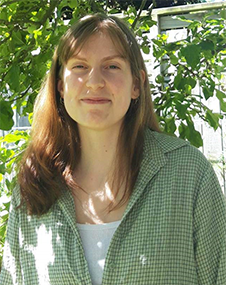
Iona Grigor
Studying for her MSc in Toxicology, Iona has been awarded $3,000 for her research into Estrogenic Contamination in Otago Waterways.
As waterborne pollutants, estrogenic compounds decrease reproduction and cause feminisation in various aquatic species, while also disrupting whole ecosystems. There is no published data on the levels of estrogens present in waters within the Otago region. However, preliminary studies have indicated that some river sites contain high levels of these compounds.
Iona's project will continue from current work being done to determine if water samples from across Otago produce an estrogenic signal, and aims to identify and quantify the compounds present. The results from this project will describe the composition of estrogenic contamination within the Otago region and can be used to create or build upon regulations surrounding water quality.
"It means a lot to get support from the Leslie Hutchins Conservation Foundation to carry out my research and contribute to their conservation efforts within the lower South Island,” says Iona. “My research is focused within the Otago region, which has been previously underrepresented, so it's awesome to be able to expand knowledge about this area.
“This scholarship has provided me the opportunity to use a wider range of experimental techniques that will deliver more robust results about which estrogens are present. This will really strengthen the application of my project to our local environment."
Aimee Pritchard
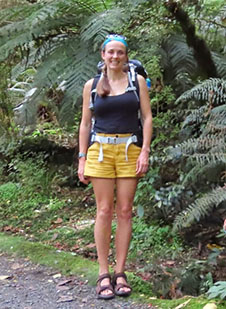
Aimee Pritchard
For her MSc thesis research in Botany, Aimee has received $7,000 for her research into Bryophytes as Diversity Indicators in the Otago Region. Bryophytes reproduce via spores rather than flowers or seeds, and include mosses, liverworts and hornworts.
The overall aim of her project is to investigate the role of bryophytes as indicators of microclimate and biodiversity in exotic versus native forest systems, for the purpose of understanding exotic plantation forest suitability for native regeneration.
The knowledge gained about bryophytes will improve the understanding of their complex interactions within forest systems and help highlight how little is known about bryophytes in relation to their level of importance in many ecosystem functions. It is possible that this could lead to them being included in future mitigation plans for a more complete protection of native forest systems.
Aimee says the scholarship will make a substantial contribution towards her master's research by paying for materials needed to complete field work and helping with childcare expenses for her two-year-old son.
“The Leslie Hutchins Conservation Foundation scholarship has been an important part of allowing me to focus on completing my field work, and now writing, without having to worry about added financial pressure,” says Aimee.
“Leslie Hutchins has been a very influential person in the field of connecting conservation and economic success in New Zealand, which is an issue that is a large part of my research.”
Aimee says her career aspiration for the future is to contribute to the scientific knowledge of plants in New Zealand and internationally, applying her knowledge to the betterment of New Zealand economically and environmentally.
“I would like to be involved in work that will allow New Zealand to build a more sustainable future and adapt to climatic changes, to pass on a clean, functional, healthy place to future generations.”
Kōrero by Margie Clark, Communications Adviser, Development and Alumni Relations Office
www.isaacconservation.co.nz
Leslie Hutchins Conservation Fund (lhcf.co.nz)
The Marks' Ecology Award, Scholarships Database, University of Otago, New Zealand

In this issue...

Law alumni celebrate milestones and share expertise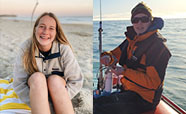
Ecological research boosted by conservation scholarships
Richness of learning goes beyond the classroom for recent graduate
Your Story – Q&A with Camden Howitt, NZ Environmental Hero of the Year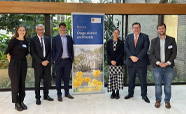
Supporting Otago
Hot Picks
University Snapshot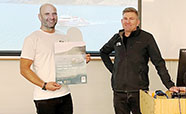
Making a Difference - ASPIRE and Surveying scholarships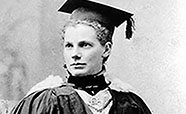
Otago Images
Alumni and academics shine in King's Birthday Honours

